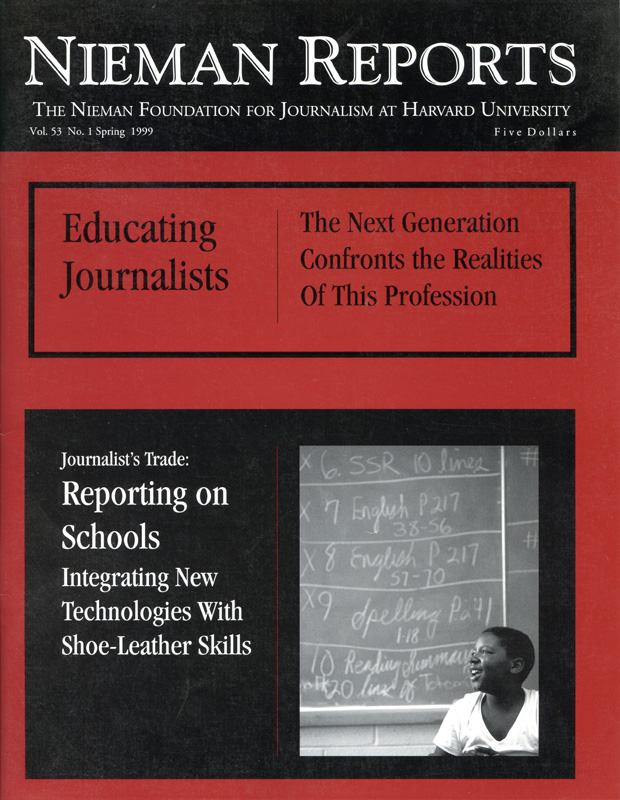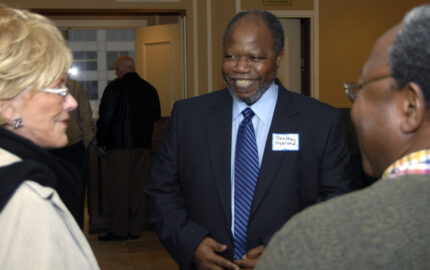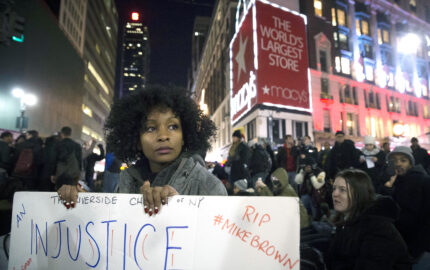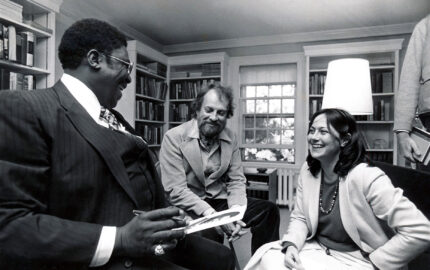Nearly four years have passed since my class toasted many farewells at the elegant Harvard Faculty Club. Our Curator, Bill Kovach, had the last word: “You are part of a community now that stretches around the world, that’s there all the time, all day, every day, with your interests and your hopes and your values in mind. And you’ve got something you can lean on the rest of your life. You’ve got something you can call on, you can enlist in your own help and your own support when nobody else is around.”
Today, as I play back my videotape of that night, Kovach’s spontaneous speech seems as prophetic as it was profound. I realized the full import of his message last summer in Africa, where I truly needed something to lean on. The Nieman connection played a serendipitous role in my overseas venture.
A few years ago, I contributed to a Nieman Reports issue on reviving environmental coverage. A year later, I got this response from Ghana, of all places: “I am Clement Wiredu, a communications programme officer with PACIPE [a French acronym for a West African environmentalist organization]. An active component of this programme is building the capacity of journalists in environmental reporting. I would be pleased if you would help by providing some resources and materials.”
Wiredu originally turned to Kabral Blay-Amihere, Editor of The Independent newspaper in the seaport capital of Accra and guiding light of West African journalism. Blay-Amihere, a 1991 Nieman Fellow, passed his copy of Nieman Reports to Wiredu. The timing was exquisite.
I happened to be mulling over an announcement of the inaugural Senator John Heinz Fellowship, which combines the training of journalists with reporting on international environmental issues. The International Center for Journalists in Washington, D.C., posts one U.S. journalist per year for up to three months in a developing country of the fellow’s choice. The program runs on a grant from The Teresa and H. John Heinz III Foundation and is named in honor of the late senator from Pennsylvania.
“How about I just show up and do the training myself?” Luckily, the fellowship judges liked this plan, and off I went in mid-June to the sweltering edge of the equator. I had my laptop, anti-malaria pills, guidebook—and absolutely no experience overseas. That’s where Nieman Fellow number two stepped in. Blay-Amihere was out of the country, so I looked up Nana Kofi Coomson from the Class of ’94.
Coomson is a business whiz, a passionate and compassionate investigative journalist and a genius in human relations, with friend and foe alike. Every day he rides a razor’s edge between freedom and incarceration as Editor-in-Chief of the country’s other independent daily, The Ghanaian Chronicle. Coomson took me under his wing the week he was set to be tried on a criminal charge of “publishing false news with the intent of injuring the reputation of the state.” He already had been detained 10 days in a nightmare of a prison—“I wouldn’t wish it on my worst enemies”—and, if convicted, faced up to 10 years there.
Yet, with all this and 32 libel suits around his neck, Coomson gleefully ushered me around Accra, a mostly disease-ridden jumble of 1.9 million. He introduced me to several of the nation’s top editors, politicians and businessmen and insisted on my staying as a guest in his home. But Coomson and I were at a loss to explain my sustained bouts of high anxiety, which soon prompted me to flee to the somewhat tamer Zimbabwe.
Enter Nieman number three, Remer Tyson, Class of ’67. The balmy, southern African country, where tobacco and cotton are king, remind Tyson of his native Georgia. He and his writer-wife, Virginia Knight, want to make the capital city of Harare their permanent home. He recently retired from The Detroit Free Press after a 12-year stint of covering war, famine and other harrowing African stories for the Knight-Ridder chain. Along the way, he became known for his courage and class.
Tyson broke my family and me into Africa as he has many a foreign journalist over the years. He introduced us to the beauty of Zimbabwe, beginning with the ancient bushmen cave drawings on the outskirts of Harare. And he was the first to figure out the source of my mysterious trauma—my malaria prevention medicine, Lariam. “Drove me batty once,” Tyson said. “I’d sooner get malaria.” On Tyson’s recommendation, I switched to a more benign prophylactic, and within a couple weeks I was well on my way to a successful fellowship.
Thanks Remer. Thanks Kofi. Thanks Kabral. As they say, once a Nieman, always a Nieman.
Chris Bowman, a 1995 Nieman Fellow, is an environmental reporter at The Sacramento Bee.
Today, as I play back my videotape of that night, Kovach’s spontaneous speech seems as prophetic as it was profound. I realized the full import of his message last summer in Africa, where I truly needed something to lean on. The Nieman connection played a serendipitous role in my overseas venture.
A few years ago, I contributed to a Nieman Reports issue on reviving environmental coverage. A year later, I got this response from Ghana, of all places: “I am Clement Wiredu, a communications programme officer with PACIPE [a French acronym for a West African environmentalist organization]. An active component of this programme is building the capacity of journalists in environmental reporting. I would be pleased if you would help by providing some resources and materials.”
Wiredu originally turned to Kabral Blay-Amihere, Editor of The Independent newspaper in the seaport capital of Accra and guiding light of West African journalism. Blay-Amihere, a 1991 Nieman Fellow, passed his copy of Nieman Reports to Wiredu. The timing was exquisite.
I happened to be mulling over an announcement of the inaugural Senator John Heinz Fellowship, which combines the training of journalists with reporting on international environmental issues. The International Center for Journalists in Washington, D.C., posts one U.S. journalist per year for up to three months in a developing country of the fellow’s choice. The program runs on a grant from The Teresa and H. John Heinz III Foundation and is named in honor of the late senator from Pennsylvania.
“How about I just show up and do the training myself?” Luckily, the fellowship judges liked this plan, and off I went in mid-June to the sweltering edge of the equator. I had my laptop, anti-malaria pills, guidebook—and absolutely no experience overseas. That’s where Nieman Fellow number two stepped in. Blay-Amihere was out of the country, so I looked up Nana Kofi Coomson from the Class of ’94.
Coomson is a business whiz, a passionate and compassionate investigative journalist and a genius in human relations, with friend and foe alike. Every day he rides a razor’s edge between freedom and incarceration as Editor-in-Chief of the country’s other independent daily, The Ghanaian Chronicle. Coomson took me under his wing the week he was set to be tried on a criminal charge of “publishing false news with the intent of injuring the reputation of the state.” He already had been detained 10 days in a nightmare of a prison—“I wouldn’t wish it on my worst enemies”—and, if convicted, faced up to 10 years there.
Yet, with all this and 32 libel suits around his neck, Coomson gleefully ushered me around Accra, a mostly disease-ridden jumble of 1.9 million. He introduced me to several of the nation’s top editors, politicians and businessmen and insisted on my staying as a guest in his home. But Coomson and I were at a loss to explain my sustained bouts of high anxiety, which soon prompted me to flee to the somewhat tamer Zimbabwe.
Enter Nieman number three, Remer Tyson, Class of ’67. The balmy, southern African country, where tobacco and cotton are king, remind Tyson of his native Georgia. He and his writer-wife, Virginia Knight, want to make the capital city of Harare their permanent home. He recently retired from The Detroit Free Press after a 12-year stint of covering war, famine and other harrowing African stories for the Knight-Ridder chain. Along the way, he became known for his courage and class.
Tyson broke my family and me into Africa as he has many a foreign journalist over the years. He introduced us to the beauty of Zimbabwe, beginning with the ancient bushmen cave drawings on the outskirts of Harare. And he was the first to figure out the source of my mysterious trauma—my malaria prevention medicine, Lariam. “Drove me batty once,” Tyson said. “I’d sooner get malaria.” On Tyson’s recommendation, I switched to a more benign prophylactic, and within a couple weeks I was well on my way to a successful fellowship.
Thanks Remer. Thanks Kofi. Thanks Kabral. As they say, once a Nieman, always a Nieman.
Chris Bowman, a 1995 Nieman Fellow, is an environmental reporter at The Sacramento Bee.



